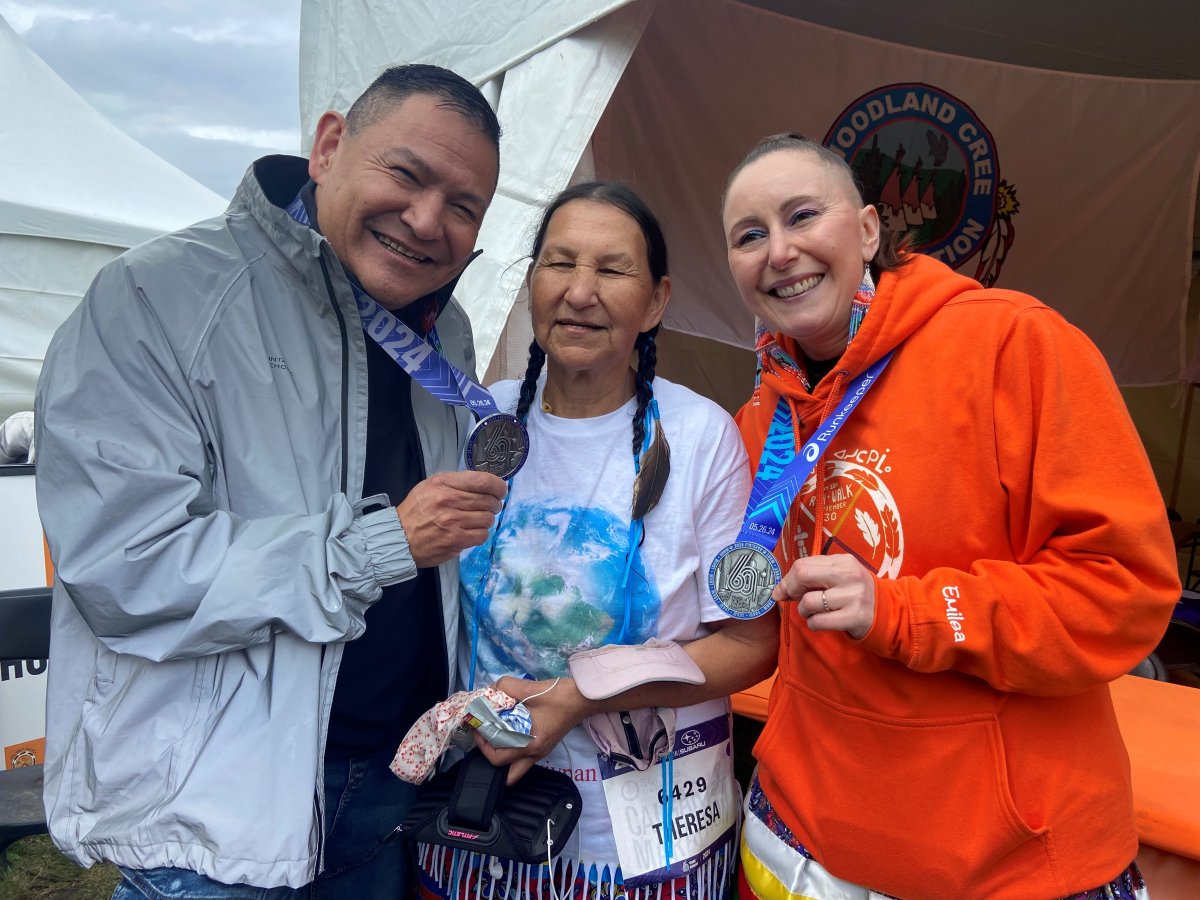The 60th edition of the Servus Calgary Marathon was held on Sunday morning with 13,600 runners crossing the finish line.

This year, marathon organizers invited an Indigenous running group to set up a tent at the finish line with members from several First Nations coming together to take part in the events.
At 69 years old, Teresa Campiou is new to competing in half marathons but growing up in the Drift Pile Cree Nation (ᒪᐦᑕᐦᑕᑲᐤ ᓯᐱᕀ mihtatakaw sîpîy) near Lesser Slave Lake, running was a part of life.
“We were quite a ways from all kinds of activities so we had to run,” recalled Campiou, who grew up working on her family farm.
She crossed the finish line at the Servus Calgary Marathon on Sunday after running the half marathon. Campiou ran in her moccasins, as she usually does, and was wearing a ribbon skirt.
She was also part of the Indigenous Runners’ Team at the Calgary Marathon.
“While I’m running, I will call on my ancestors. I will communicate with my relatives who have passed on and it’s a way of bringing them closer to me without any interruption,” Campiou said.
As she’s running, Campiou says she connects with her son, daughter and granddaughter, who have all passed away .
She said the grief of those loses is compounded with intergenerational trauma but Cardinal said this is also a place for healing.
“It’s a beautiful thing and a generational thing as well. There is intergenerational trauma, there is also generational healing and there’s ways to do that and running is one of them. To be out on the trails – being out on the land – that is a way of healing and a way of reclaiming,” Cardinal said.
Anita Cardinal is Nêhiyaw (Cree) and a member of the Woodland Cree First Nation located on Treaty 8 territory. She started a running group in Edmonton after noticing a lack of diversity in the running community.
Cardinal is the founder of Indigenous Runners YEG and the founder and race director for the annual Orange Shirt Day Run, as well as the walk in Edmonton held on the National Day For Truth and Reconciliation.
“Our ancestors have ran on this land since time immemorial along these rivers,” she said gesturing at the Elbow River near the finish line of the Calgary Marathon.
The Edmonton lawyer and ultramarathon runner says she inherited her love of running from her father who used to run to the next town to visit her mother.
“He would just show up in a flash,” laughed Cardinal. “When I was a kid, what I remember about my childhood is how much my dad was always running with us and playing games.”
Cardinal said running holds a powerful cultural significance for her.
“It’s a place of peace and gratitude. Running is healing and running is prayer and running is ceremony. That’s the connection with the land that we have,” Cardinal said.
Emilea Karhioo-Saadeh drove from Edmonton to take part in the run. She says, like other trail runners who are part of Indigenous Runners YEG, she’s not plugged into any electronics.
“When I run on the trails, I take time to stop and touch the trees and touch the leaves and look at the flowers. When I’m running, it’s a time to pause and think and reflect,” Karhioo-Saadeh said.


Comments